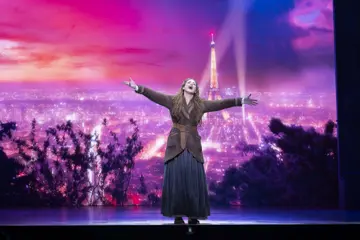The first time in Toronto someone was staring at my chest, I thought he was checking me out. But soon I learnt better. Credential-Reading is a sport unto itself at the Toronto International Film Festival, which, for all its red (or orange) carpet galas, Hollywood celebrities, and status as the official opening of Oscar-prediction season (lock in The Danish Girl as instant, odds-on favourite!), feels as much like a convention as anything else. All those endless lanyarded peoples aren't, when they peer down south of your face, ogling your rack, but your laminate; wondering if, perhaps, you're a somebody they oughta know.
This makes TIFF the most film festival of film festivals; a definitive event for the movie-biz, given that its existence bends to those in the biz. Whole city blocks are shut down —much to the chagrin of local motorists, apparently, given the endless honking— so that its vast industry contingent can amble freely from hotel to panel to screening, from queue to queue to queue.
There's celebrities on the streets of Toronto, to be sure — when Johnny Depp touches down somewhere, he doesn't need his dogs to create a wild scene — but there's 'industry' in their endless thousands; their numbers only rivalled by the minimum-wage youth whose McJobs involve handing out free shit on behalf of the endless festival sponsors.
The downtown becomes a TIFF-themed 'block party', which is really one giant branding opportunity; the unofficial mascot of this precinct Matt Damon's Martian visage, which is plastered, postered, and projected all over the city, repeated unto infinity with Warholian effect. The city itself is, if not exactly overtaken by TIFF fever, at least sniffin' TIFF cash-making opportunities. You have to admire the hustle of, say, one "gentleman's establishment" on Yonge with a sign proudly boasting that it's #TIFF2015 Lapdance Headquarters.
Don't miss a beat with our FREE daily newsletter
Amidst this jamboree, across 10 days, 300 films screen across 29 cinemas, which include the cavernous opera house the Roy Thomson Hall, the glamorous Princess of Wales Theatre, and an entire 14-cinema multiplex, the Scotiabank, that includes two IMAX screens within. Into this madness, this vastness, your old pal Film Carew took the plunge.
Day One
Press and industry get their own separate screenings at the TIFF, and they start early. Hitchcock/Truffaut is the perfect way to kick the dew off opening day. Kent Jones's documentary comes billed as the story behind the 1967 book of the same name: a meeting between an old English master and his young French acolyte that produced one of the definitive texts on cinema. But, instead, it becomes something much nerdier, much better: a conversation about Hitchcock's craft in which David Fincher and Olivier Assayas —amongst the ranks of auteurist talking heads — show fascinating insights into both Hitch and cinema.
Dheepan won the Palme d'Or at Cannes this year, and you can see why. It's one of Jacques Audiard's signature stories: a socio-realist drama that slowly, almost imperceptibly tilts into a crime thriller; echoing his past hits Read My Lips and A Prophet. Here, the milieu is a trio of Tamil refugees who pose as a family to earn exile in France; the 'husband' ending up as a caretaker at a crime-riddled council estate. Audiard oscillates between grim realism and sweet poetry, the past always lingering in the present; light and life dancing in every frame.
Everything Will Be Fine finds James Franco playing the world's most boring writer, effectively bringing down the film from within. When your main character is a dour dufus who rarely shows emotion, the drama itself is hardly going to leap off the screen. Perhaps that's why Wim Wenders chose, strangely, to shoot its stern drama in 3D; the eye-popping popcorn format here used to, I guess, make trees look really good. Franco bumbles through an awards-movie soup of grief and guilt and issues, with Rachel McAdams (in Québécois accent!), Marie Josée-Croze, and Charlotte Gainsbourg all, somehow, in thrall to our deadly dull man.
Tolga Karaçelek's Ivy is one of those films where a bunch of guys trapped on a boat together go crazy; it never rising beyond the generic nature of its genre set-up. A far better Turkish film is Mustang, which openly echoes The Virgin Suicides as it gives us five sisters who incite moral panic in a seaside village by dint of their nascent adolescent sexuality, causing their evil uncle (Ayberk Pekcan from Winter Sleep) to lock them up in their family villa. With the house turned into a "wife factory", the first sisters are married off, before comedy, tragedy, and, eventually, heroic jailbreak escape break out.
When Mustang's director, Deniz Gamze Ergüven, and its 5 budding starlets all come out in various frocks for the post-public-screening Q&A, there's wild, thunderous applause, howls and hoots, and, finally, a standing ovation. And all this clamorous enthusiasm makes me yearn for the general give-a-shit vibes that reign in Australia in the face of special-guests and Q&As. So I split, out the door, out through the pall of pot smoke lingering over those hardcore nerds waiting in the Rush queue for the midnight premiere of Jeremy Saulnier's Green Room, and walk due East, off to truly embrace the cinematic lore of Toronto. I'm making a Scott Pilgrim pilgrimage to Hillcrest Park, which means cutting through leafy Cabbagetown streets, wandering semi-clueless in the dark, until I find my destination. Well, kind of. I see the stairs where Scott and Ramona rendezvous (she's on time!), and the concrete circle where there swings should be. But there's no swings; no movie-set to step into; no snowy romance in the air. As always, the movies seduce us, but they're not reality. TIFF is only one day old, but already it's a long story filled with sighs.
Day Two
TIFF is the kind of place where they hold an opening-night gala of Demolition, then turn around and hold an industry extravaganza at 8.30am the next morning. As Canadian filmmaker-made-good, Jean-Marc Vallée is an obvious opening-night choice, but the film itself is genuinely odd. It starts out as so much Oscarbait, with that great contemporary cliché of two characters talking in a car soon to be met with a side-on collision. When his wife dies in the accident, Jake Gyllenhaal duly falls apart, and takes stock of his empty rich-financial-analyst life. But, if anything, Demolition is an oddball comedy about the destructive desires that can't be soothed by self-help platitudes; the oh-so-metaphorical script finding Jakey G, in bug-eyed post-Nightcrawler form, wanting to take apart all the machinery that surrounds him, and to demolish any structure that he sees. It seems, in the end, a little too strange to become an awards-season rallying cry.
Brooklyn, however, could easily be all over Oscar season. It's a non-threatening, softly-lensed, vintage-frock’d matinée in which Saoirse Ronan plays a mid-20th-century Irish immigrant to New York, who has no calamities befall her, no exploitative pimps or bosses waiting, no suffering. Instead, she gets on with life and works her way up with a sensible nature and a gentle smile, until home comes callin'. The most exciting part of the film isn't when she gently cries or gets hitched or is a feisty independent woman ahead of her time, but when Jessica Paré shows up with her amazing teeth.
Youth is pure Paolo Sorrentino: a collection of music videos (at one point, it's literally a Paloma Faith video) mounted around a vague idea of a story, with lots of aging flesh, strident caricatures, and cinematic self-reference dancing through his vivid, visionary visuals. Michael Caine and Harvey Keitel play an aging composer and director, respectively, holed up in a Swiss mountain retreat, with everyone from Mark Kozelek to Diego Maradona amongst the guests. When Jane Fonda shows up playing an aging starlet, Sorrentino tries to mount a state-of-cinema commentary, yet, really, the film is but a beautiful balloon: light, colourful, whimsical, and essentially empty.
Men & Chicken is a zany Danish knees-up that takes a pro-genetic-manipulation stance as its central comic conceit; with Mads Mikkelsen donning some wild prosthetic mackup and getting downright wacky. But, somehow, it doesn't quite take; writer/director Anders Thomas Jensen trying too hard to shock, repulse, or get laughs. The same essentially applies for Kill Your Friends, which has a great premise — American Psycho with '80s Wall Street greed swapped for Brit-pop-era music-biz greed — and moments of incisive satire. But when Nicholas Hoult turns from cokehead to killer, the film stalls out; it's essentially one joke — A&R men actually hate music — stretched too far.
Schneider vs Bax also has a single idea, but director Alex van Warmerdam — following up Borgman — metes it out meticulously. Schneider (Tom Dewispelaere) and Bax (van Warmerdam) are twin contract killers set against each other in a stand-off at a remote, swampside cabin; the former a meticulous family-man for whom killin' is a business, the latter a doped-out reprobate who balances booze with coke with speed with etc. A whole ensemble of oddball characters eventually converge on the one locale, but the film climaxes in near silence, in a deftly-mounted sequence of sustained tension.
Day Three
And then the rains came. The TIFF good-time party was drenched on its first weekend, with anyone unfortunate enough to queue for a film in the rain left to huddle under poncho or umbrella. Whilst the press and public are, once inside the cinemas, kept apart, I happily journeyed into the unwashed (and/or rain-drenched) ranks to see Jeremy Saulnier's Blue Ruin follow-up, Green Room. And with a rowdy crowd of Midnight Madness enthusiasts — following local tradition by cheering wildly for the 'thanks to our volunteers' slide, then aaargh-ing like pirates for the ‘no authorized duplication of materials' type slide — to greet it, the flick plays like gangbusters. It finds a punk band (whose ranks include Anton Yelchin and Alia Shawkat) and a local sharp (Imogen Poots) in a survival-thriller, horror-tinged siege movie; a last-minute show at a rural skinhead bar turning decidedly evil. Saulnier describes it as influenced by both River's Edge and Scooby Doo, and anyone with a fear of canines best stay away from its horrifying, throat-ripping attack-dogs. The director comes out at the end, as does the principle cast, which is headlined by Sir Patrick Stewart, who plays the chief neo-Nazi. Captain Picard describes himself as having been "shit-scared" when he read the script; a feeling many in the cinema have just shared.
Beasts Of No Nation is also plenty bloody and terrifying, but in a different way. It's a portrait of child soldiers recruited into a rebel militia — in an unnamed African country — lead by charismatic, paternal Idris Elba, with machete murders and machine-gunfire aplenty. It's Cary Jojo Fukunaga's attempt to leverage the goodwill of True Detective (Season One only!) into a Big Auteur prestige picture, and it feels like a next-level successor to his debut, Sin Nombre, with plenty of well-choreographed shoot-outs and manly, Kubrickian tracking shots.
Our Brand Is Crisis comes at the Awards Show season from another angle: the smart, satirical comedy. It finds Sandra Bullock as a political strategist recruited to head the backroom election-campaign team behind a right-wing, IMF-endorsed candidate in Bolivia. It walks a tricky Hollywood line of wanting to be vaguely 'humanist' whilst never explicitly political, an 'outsider' to a distant country whilst not quite being culturally offensive. It gets there, just, aided by the comic timing of Bullock vs Billy Bob Thornton and the direction of David Gordon Green.
Amidst all the Oscarbait, there's still plenty of room for pure art-movies, like Ben Rivers' The Sky Trembles And The Earth Is Afraid And The Two Eyes Are Not Brothers, another mix of ethnographic cinema, art-movie minimalism, and musical ritual, which peaks with the glories of the King Of Cans, a Mighty Boosh-esque, tin-lid-covered character who lives a life of indentured dancing amidst nomads in the Moroccan mountains. The Apostate, from Uruguayan director Federico Veiroj, is a piece of slender, incisive social commentary, concerning solely one man's foiled attempts to have his name officially removed from the register of Spanish Catholics. Semana Santa, the debut film for Mexican director Alejanda Márquez Abella, is a sweet, small, socio-realist drama about a wayward mother, her young son, and her stoner boyfriend on a beach holiday together; each going their separate ways for ill-advised misadventures over one transformative night.
And Eva Doesn't Sleep is a true TIFF highlight: Pablo Agüero composing a series of brilliant single-take sequences as he charts the quarter-century odyssey of Eva Perón's corpse after her tragic death. Having died at 33, like Christ, here Evita is a figured resurrected, again and again, to suit the Argentine political mood; in a triptych of stories (within one framing narrative) that finds, amongst others, Gael García Bernal swearing and smoking, and Denis Lavant fighting shirtless. It sounds like a black comedy, but Agüero's film is dark, surreal, and unforgettable, highly reminiscent of Pablo Larraín's Post-Mortem. Handsome Gael himself bounds out, bouncy and small, for an pre-show introduction; and Agüero thoughtfully answers vague audience questions in a post-screening Q&A. The film and conversation are so good I don't regret that it ends past midnight, and finds me deposited into the day's endless rainstorm, instantly drenched, with but a few hours to rest up for the next day.
Day Four
Holy fuck, it's a new Charlie Kaufman film! With stop-motion puppets! Having the hottest puppet-on-puppet sex since Team America: World Police! Whereas, with his directorial debut, Synecdoche, New York, Kaufman wanted to put everything he was thinking and feeling into one vast, ever-unfolding film — to contain the world within its worlds-within-worlds — here, with Anomalisa, he perfectly captures a simple idea: a sales-seminar guru (voiced by David Thewlis), on the road in Cincinnati, has a one-night stand with a star-struck office-worker (Jennifer Jason Leigh), and it may either be a meaningless one-off or a profound revolution in his life. Of course, in the margins, there's plenty of Kaufmanism: the puppets exist as puppets, with wobbly limbs and detachable faces; every character is incredibly socially awkward; the guru gives a disastrous public speech; and, oh yes, everyone else in this entire cinematic world — from waitresses to kids — is voiced by the OG Hannibal himself, Tom Noonan.
The Reflektor Tapes would've been a blast to watch amidst a big, dressed-up, ready-for-fun general public crowd, instead, in a sparsely-populated industry screening, I'm left to seat-dance on my lonesome. It seems so empty because it's in a cavernous IMAX theatre, but this setting makes for projection glories: the flick looks great and sounds fucking awesome. Kahlil Joseph's impressionist portrait of Arcade Fire recording and touring Reflektor takes a collagist approach, never letting the music subside in a bright, wild cinematic mixtape that goes out of its way to dodge rockumentary cliché.
If It Follows piqued an audience craving for spectral STDs, then the oddly-named, genuinely-odd Lace Crater swans right into this latest ultra-niche genre. Essentially a mumblecore take on horror tropes — it features mumblecore it-boy Keith Paulson and Smokin’ Joe Swanberg — the flick finds Lindsay Burdge, when on a weekend away at a Hamptons beach-house, sleeping with a spectral, hessian-sack-draped wraith named Michael. Back in Brooklyn, she goes through those familiar undead transformations: oozing unknown substances, vomiting black liquids, turning eerily pallid. But director Harrison Atkins plays these as, essentially, a hipster social faux-pas; Lace Crater climaxing at a super-awkward house-party where everyone can't believe the girl who fucked the ghost has shown up.
And, if TIFF marks the official start of Oscar Season, then The Danish Girl has leapt out of the blocks as firm early favourite. You don't even need to see the film to guess that: it finds 'Hanging With' Tom Hooper (The King's Speech, Les Miserables) directing Eddie Redmayne in a portrait of Danish artist Lili Elbe, one of the first people to undergo gender reassignment surgery in the early 20th-century. As with his Oscar-winning Theory Of Everything turn, Redmayne is transformative and technically brilliant, his Englishman's eyes watering with emotion. Hooper will occasionally throw a wild, decentred composition into frame to remind you that you're not watching a telemovie, but the vibe is entirely tasteful, the emotions grand, the effect crowdpleasing, the subject matter so of-the-zeitgeist that it plays perfectly circa 2015. It gets a standing ovation from the huge gala crowd, and Hooper gets another when he comes out; the audience reaction so warm that, overwhelmed, he cries on stage. The Oscars are made for moments like that, and The Danish Girl seems all too likely to be all over them come February.















